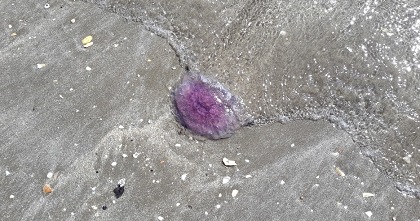
Auckland Council is warning swimmers to exercise caution following reports of jellyfish at some local beaches this month.
“Several members of the public have reported having been stung by jellyfish at Maraetai Beach, Eastern Beach and Mellons Bay recently, and we advise the public to avoid swimming at these beaches for the time being,” says the council’s regional environmental control manager, Marcus Herrmann.
“Swimmers should keep an eye out for jellyfish when at the beach. If they are present, we recommend finding an alternative swimming location for the day.
“We also recommend that parents closely monitor their children and pets near the water at these beaches to ensure their safety,” he says.
Medical advice
The Auckland Regional Public Health Service says most jellyfish stings in New Zealand are not serious and, if given prompt first aid, people are not likely to develop significant symptoms.
Symptoms of jellyfish stings include immediate intense pain, with burning and itching at the site of the sting.
The sting often appears as a welt with surrounding redness. In rare cases, victims can develop symptoms such as breathing difficulty or loss of consciousness.
How to treat a jellyfish sting
Wash the affected area with fresh or saltwater.
Remove any tentacles or stings attached to the skin – but do not touch the tentacles or stings with your bare hands.
Place the affected area in warm water (45C).
Do not apply vinegar, methylated spirits or alcohol, as these will make the sting more painful.
Calamine lotion, antihistamines and steroid creams may be helpful.
If the reaction to the sting is severe or the symptoms worsen, see your doctor. If the person has reduced consciousness or difficulty breathing, call 111 and ask for an ambulance.
For more information on jellyfish stings, please visit the Auckland Regional Public Health Service website or call 09 623 4600 for advice.
More information on water quality monitoring is available on the Safeswim website or by calling 0800 SAFESWIM (0800 723 379).










